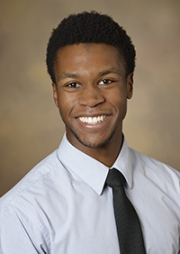Taking ‘Do No Harm’ to Heart
No doctor wants to treat a patient with a medication that’s worse than the disease. Ike Royal Chinyere, MD-PhD candidate at the University of Arizona College of Medicine – Tucson, is developing a system that may help doctors select the most effective and minimally toxic drugs for heart failure patients.
Born and raised in Kingman, Arizona, to Anselm and Stella, a pharmacist and a nurse who emigrated from Nigeria, Chinyere moved to Tucson for his undergraduate studies in honors physiology after high school.
“Starting in my high school courses, I developed a deep respect for the heart and its intricacies,” Chinyere said. “It truly is amazing how electrical activity precisely controls the mechanical activity and they work together incessantly for decades.”
This fascination with the cardiovascular system in healthy states and disease states fuels Chinyere’s drive for medical innovation.

[Dr. Steven Goldman, Ike Royal Chinyere and Dr. Elizabeth Juneman] As an undergraduate, Chinyere began performing research in the UA Sarver Heart Center under the mentorship of accomplished physician-scientists, including Steven Goldman, MD, professor of medicine, Elizabeth Juneman, MD, associate professor of medicine, and Jil Tardiff, MD, PhD, professor of medicine and cellular and molecular medicine. Chinyere has been developing a platform to evaluate drug effectiveness and toxicity for different conditions, such as heart failure and atrial fibrillation.
This platform is more specific than the models now used by large pharmaceutical companies and regulatory agencies, such as the Food and Drug Administration, which often fail to accurately predict effects in patients.
“My vision is to incorporate components of precision medicine into the drug-screening world, to continue to avoid patient harm, but also ensure that revolutionary drugs make it through the development pipeline,” Chinyere said. “As our skill in creating therapies improves, our ability to screen these complex therapies must quickly follow suit, in order to protect the public.”
Chinyere’s focus and accomplishments have led to numerous research and academic awards. He was deemed a nationally competitive applicant for MD-PhD programs across the country, and he chose the UA.
“It was through my mentors, both academically and personally, that I learned the skills and the character necessary to succeed,” Chinyere said. “Though I had the opportunity to pursue professional education elsewhere, I felt my story was not over in Tucson, and I had the faith that all I needed to continue thriving was here.”
Now in his third year of the MD-PhD program, Chinyere’s doctoral studies focus on cardiac electrophysiology in the physiological sciences program. Chinyere is funded by the National Institutes of Health under the local supervision of Carol Gregorio, PhD, vice dean of innovation and development and director of the Molecular Cardiovascular Research Program, and John Konhilas, PhD, associate professor of cellular and molecular medicine and biomedical engineering.
Chinyere’s long-time mentor, Dr. Goldman, has been developing a therapeutic patch for heart failure patients. It is seeded with cardiomyocytes (heart muscle cells) created by “reprogramming” other cells from a patient’s body, called induced pluripotent stem cells. This patch is implanted surgically on the surface of the heart and has the potential to be one of the first regenerative therapies in cardiology. Chinyere’s research revealed that this patch can be reformulated to treat more than just heart failure: It also can be used as a screening platform. It functions very similarly to a real human heart and may predict drug effects better than current models.
“It is said that if you love what you do, you’ll never work a day in your life. I love where I am and I love what I do,” Chinyere said. “I pay homage to my many mentors for giving me opportunities to succeed, my family for supporting me though challenging times and my friends for giving me reasons to smile.”
Read more stories in the University of Arizona's Wildcat Country.

